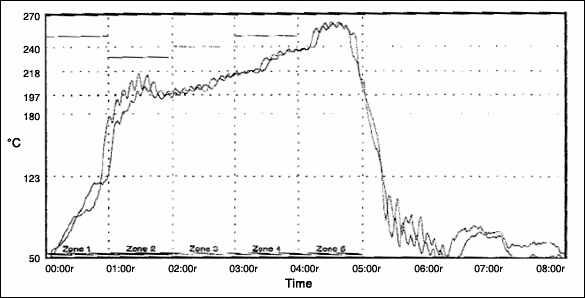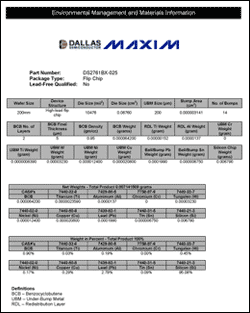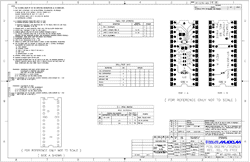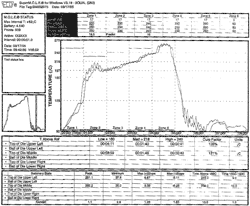Abstract: Recently, the European Union has passed the Restriction of Hazardous Substances (RoHS) directive, which strictly prohibits the use of lead (Pb) in electrical and electronic products. Based on this specification, the assembly process must also meet lead-free requirements. The DS2761 flip chip has been exempted from RoHS specification requirements, and has been successfully installed using a lead-free assembly process. This application note details the use of lead-free assembly processes and reliability issues after installation.
According to the RoHS directive, many processing procedures must use lead-free solder. Dallas Semiconductor used a reflow soldering installation process with a peak temperature of + 262 ° C to assemble 479 flip-chips. After installation, we conducted standard reliability tests on flip-chips. The DS2761 flip chip has zero failure rate, and all have passed the reliability evaluation. DS2760 C2 and DS2761 A2 use the same bare die, which confirms that the DS2761 is completely acceptable for installation using a lead-free reflow soldering process according to the parameters listed in this article.
Overview The European Union has recently begun to restrict the use of lead (Pb) elements in electrical and electronic equipment. These specifications refer to the 2002/95 / EC directive in form, but they are often referred to as the Restriction of Hazardous Substances (RoHS) directive. Restricted substances are listed in the appendix of the RoHS directive (page 5). The seventh article in the appendix states that lead exists in solders with a high melting temperature (for example, in tin-lead alloy solders, lead accounts for more than 85%). "Dallas' solder ball process is commonly referred to as" flip chip ". Because its solder ball structure contains 95% high melting point lead (Pb) solder, it is a RoHS exempt product. For details of DS2761 material composition analysis, please refer to this article The content of hazardous substances in DS2761 in Appendix A.
According to the RoHS directive, many processing procedures must use lead-free solder. DS2761 has successfully passed the reliability test after being soldered with lead-free process. This article describes the reflow soldering process and reliability test results.
The lead-free process circuit board installation process DS2761 flip chip is mounted on the FR4 PCB in a high-temperature environment with Tg> + 170 ° C. Appendix B gives the CAD drawing of the circuit board. The flip chip is soldered using indium 5.1 lead-free solder (refer to indium 5.1 product data) that meets the Indium CorporaTIon of America® standard, and the DS2761 flip chip is sent to the 5-zone BTU mode SSA 70 reflow furnace for installation. The conveyor belt in the furnace is set to deliver 16.5 inches per minute, and the temperatures in zones 1 to 5 are: + 250 ° C, + 230 ° C, + 240 ° C, + 250 ° C, and + 280 ° C. The peak reflow temperature is + 262 ° C. The reflow soldering characteristic curve is shown in Figure 1, and Appendix C also gives the curve.

Figure 1. DS2761 reflow soldering characteristic curve
After the DS2761 reliability test is processed through a lead-free soldering process, we conduct industry-standard reliability tests on 479 chips mounted on a circuit board. Tests include working time, storage time, and chip temperature, temperature and humidity tolerance. After completing all tests, the failure rate of the DS2761 flip chip is zero. The reliability test report can be downloaded.
Conclusion According to Article 7 of the RoHS Directive Annex, Dallas Semiconductor's DS2761 flip chip is a RoHS Directive exempt product. Since the chips still need to be installed using a lead-free reflow soldering process, Dallas Semiconductor installed 479 flip-chips using a soldering process with a peak temperature of + 262 ° C, and conducted standard reliability tests on these chips after installation. The failure rate of the DS2761 flip chip is zero, which completely passed the reliability assessment. It can be seen that DS2761 can use the lead-free reflow soldering installation process for soldering according to the parameters listed in this article. DS2760 C2 and DS2760 A2 use the same die, so this evaluation certification is also applicable to DS2760 C2 version.
Appendix A. Composition of hazardous substances in DS2761

Click on the big picture
Appendix B. High Temperature Soldering FR4 Circuit Board Diagram

Click on the big picture
Appendix C. Reflow curve of lead-free solder

Click on the big picture
According to the RoHS directive, many processing procedures must use lead-free solder. Dallas Semiconductor used a reflow soldering installation process with a peak temperature of + 262 ° C to assemble 479 flip-chips. After installation, we conducted standard reliability tests on flip-chips. The DS2761 flip chip has zero failure rate, and all have passed the reliability evaluation. DS2760 C2 and DS2761 A2 use the same bare die, which confirms that the DS2761 is completely acceptable for installation using a lead-free reflow soldering process according to the parameters listed in this article.
Overview The European Union has recently begun to restrict the use of lead (Pb) elements in electrical and electronic equipment. These specifications refer to the 2002/95 / EC directive in form, but they are often referred to as the Restriction of Hazardous Substances (RoHS) directive. Restricted substances are listed in the appendix of the RoHS directive (page 5). The seventh article in the appendix states that lead exists in solders with a high melting temperature (for example, in tin-lead alloy solders, lead accounts for more than 85%). "Dallas' solder ball process is commonly referred to as" flip chip ". Because its solder ball structure contains 95% high melting point lead (Pb) solder, it is a RoHS exempt product. For details of DS2761 material composition analysis, please refer to this article The content of hazardous substances in DS2761 in Appendix A.
According to the RoHS directive, many processing procedures must use lead-free solder. DS2761 has successfully passed the reliability test after being soldered with lead-free process. This article describes the reflow soldering process and reliability test results.
The lead-free process circuit board installation process DS2761 flip chip is mounted on the FR4 PCB in a high-temperature environment with Tg> + 170 ° C. Appendix B gives the CAD drawing of the circuit board. The flip chip is soldered using indium 5.1 lead-free solder (refer to indium 5.1 product data) that meets the Indium CorporaTIon of America® standard, and the DS2761 flip chip is sent to the 5-zone BTU mode SSA 70 reflow furnace for installation. The conveyor belt in the furnace is set to deliver 16.5 inches per minute, and the temperatures in zones 1 to 5 are: + 250 ° C, + 230 ° C, + 240 ° C, + 250 ° C, and + 280 ° C. The peak reflow temperature is + 262 ° C. The reflow soldering characteristic curve is shown in Figure 1, and Appendix C also gives the curve.

Figure 1. DS2761 reflow soldering characteristic curve
After the DS2761 reliability test is processed through a lead-free soldering process, we conduct industry-standard reliability tests on 479 chips mounted on a circuit board. Tests include working time, storage time, and chip temperature, temperature and humidity tolerance. After completing all tests, the failure rate of the DS2761 flip chip is zero. The reliability test report can be downloaded.
Conclusion According to Article 7 of the RoHS Directive Annex, Dallas Semiconductor's DS2761 flip chip is a RoHS Directive exempt product. Since the chips still need to be installed using a lead-free reflow soldering process, Dallas Semiconductor installed 479 flip-chips using a soldering process with a peak temperature of + 262 ° C, and conducted standard reliability tests on these chips after installation. The failure rate of the DS2761 flip chip is zero, which completely passed the reliability assessment. It can be seen that DS2761 can use the lead-free reflow soldering installation process for soldering according to the parameters listed in this article. DS2760 C2 and DS2760 A2 use the same die, so this evaluation certification is also applicable to DS2760 C2 version.
Appendix A. Composition of hazardous substances in DS2761

Click on the big picture
Appendix B. High Temperature Soldering FR4 Circuit Board Diagram

Click on the big picture
Appendix C. Reflow curve of lead-free solder

Click on the big picture
Yuchai 76-200KW Diesel Generator
Yuchai 76-200Kw Diesel Generator,Yuchai 200Kw Generator,Yuchai Engine Generator,Diesel Generator With Yuchai Engine
Shanghai Kosta Electric Co., Ltd. , https://www.kostagenerators.com